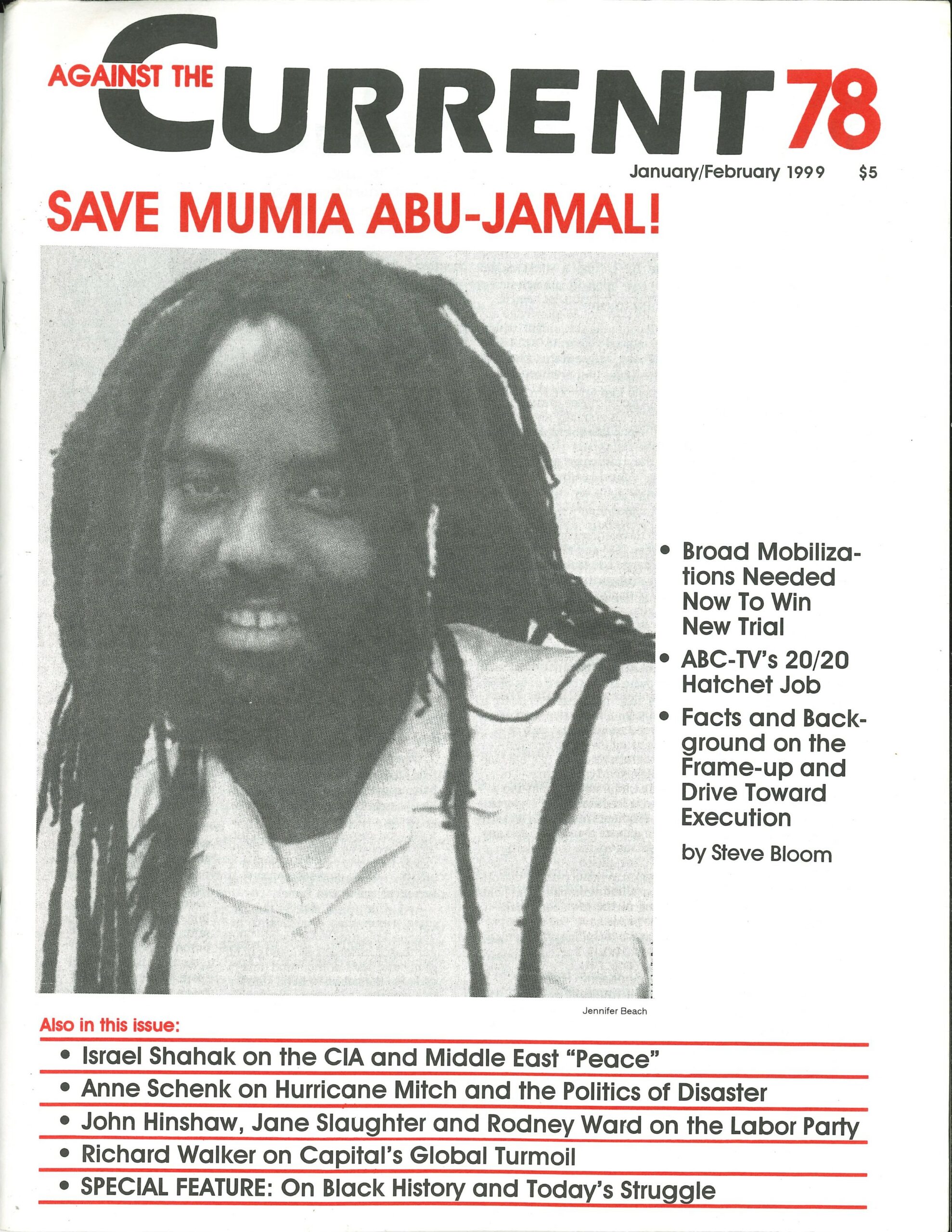Against the Current, No. 78, January/February 1999
-
The Cynicism and the Slaughter
— The Editors -
The Labor Party's Pittsburgh Convention
— John Hinshaw -
The Labor Party in the Big Picture
— Jane Slaughter and Rodney Ward -
Hurricane Mitch and Disaster Relief: The Politics of Catastrophe
— Anne Schenk -
Remembering Pinochet's Coup: A Taste of Justice for Chile
— Marc Cooper -
El Salvador's New War: Lesbian/Gay Activism Confronts “Social Cleansing”
— Anne Schenk -
The CIA and the "Peace Process"
— Harry Clark interviews Professor Israel Shahak -
PA Supreme Court Rejects New Trial for Mumia
— Steve Bloom -
An Introduction: Capital's Global Turbulence
— Richard Walker -
Capital's Global Turbulence
— Richard Walker -
Random Shots: Notes From Starr's Chamber
— R.F. Kampfer -
The Rebel Girl: Barbara Kingsolver's Triumph
— Catherine Sameh -
Radical Rhythms: A Band Whose Time Has Come
— Daniel L. Widener - Black History and Today's Struggle
-
In Honor of Assata Shakur
— Daniel L. Widener -
Race and Politics
— Malik Miah -
Race from the 20th to the 21st Century: Multiculturalism or Emancipation?
— E. San Juan, Jr. -
Review: Moving Beyond Black and White?
— Tim Libretti - Reviews
-
Labor Organizing in a Lean World: Workers of the World Unite?
— Ralph Armbruster-Sandoval -
The Cocaine-Contra-CIA Complex
— Larry Gabriel -
Halting British Fascism
— Gerd-Rainer Horn -
An Experiment in Democracy
— Dan La Botz -
Surrealism Against Racism
— Michael Löwy -
Capital on CD-Rom, Cat Optional
— Joel R. Finkel - Dialogue
-
Black Liberation, Working-Class Unity, and the Popular Front: A Reply to Mel Rothenberg
— Michael Goldfield -
After Stalinism: An Exchange
— Dave Linn and Susan Weissman -
A Rejoinder: Strategy or Doctrine?
— Mel Rothenberg - In Memoriam
-
A Farewell and Tribute: Rose Lesnik, 1924-1998
— Estar Baur
Catherine Sameh
IT IS A distinct pleasure to witness a favorite novelist become an even better storyteller, without losing her politics. Such is the case with Barbara Kingsolver and her new novel
In 1959 Nathan uproots his wife Orleanna and their four daughters Adah, Leah, Ruth May and Rachel from the American South and drags them to the middle of the Belgian Congo, where they attempt to carve out a life in the village of Kingala.
As a white middle-class American family in the late 1950s, the Prices have no less than a disastrous time adjusting. While the Rev. Price is bent on bringing Christianity to the villagers and dominating his family, his wife tries to make a home for herself and her daughters.
Both Christianity and the Prices’ notion of home are deeply challenged by the villagers of Kingala and life in the Congo, as the story unfolds through the narration of each daughter.
Rachel is the oldest, an American teenager preoccupied with the superficial world of clothes and beauty. Kingsolver uses Rachel to represent the worst of middle-class American characteristics—small-mindedness and self-absorption—and the values of materialism and colonialism.
Of the four daughters Rachel struggles the most in her new surroundings, finally as an adult moving to South Africa where she can remain a permanent colonialist. Ruth May is the youngest, and through her eyes—and those of the trained biologist Kingsolver—we experience the beautiful, deadly and diverse natural world of Africa.
Adah, one half of a set of twins, is physically disabled but brilliant. Adah does not speak, but plays with language with the command of a trained linguist. Her physical impairments leave her an outsider within her own family, and for comfort and company Adah dissects and rebuilds words. Through her we see how rich and multiple words and worlds can be, and how connected all languages are.
Leah Price, Adah’s twin, is the soul of the novel. When we meet her she is still devoted to her father, and almost as scholarly as he when it comes to quoting the Bible. She is a natural seeker and practitioner of justice, bright and tender.
More than any other family member, Leah adapts to her new home by making friends with the villagers, participating in village life and working hard to mitigate her family’s colonial presence. Naturally, her blind filial devotion is shattered the longer she lives in the Congo, and as she comes into her own as a young woman.
The Congo’s independence struggle runs parallel to Leah’s own independence. As she challenges her father’s patriarchal rule, his racist and imperialist Christianity and his sexist treatment of his wife and daughters, so the Congolese independence movement throws off colonial rule and ushers in its first democratic president—Patrice Lumumba.
Anti-colonial and liberation struggles are certainly not new themes for Kingsolver. In
In
Leah marries a Lumumba supporter, who is imprisoned by the Mobutu regime. The Congo becomes Zaire, the Price daughters grow up, and we are taken through three more decades of African politics. While the last third of the novel is a hurried attempt to bring this 500-plus pages epic to a close, Kingsolver’s writing has never been more powerful and compelling.
Although space prevents me from a meatier review, I hope I’ve piqued your interest. For lefties hungry for the fusion of political history with poetic storytelling,
ATC 78, January-February 1999

